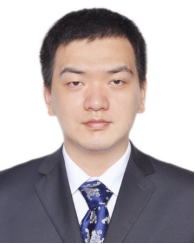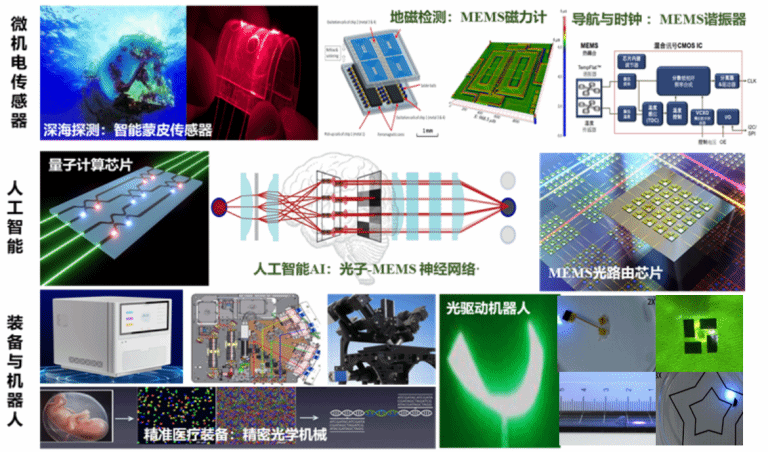
Personal Profile:
Tu Xin, is an associate professor, doctoral supervisor, and CUG scholar - Young Talents Program. He received his bachelor’s degree from Tianjin University and the PhD degree from the joint program between Fudan University and University of Michigan, Ann Arbor. He had engaged in R&D at Huawei Technologies Co., Ltd. and Tohoku University in Japan. As of the end of 2023, he has presided over and participated in 2 programs of the National Natural Science Foundation of China, 3 GF projects, 1 program supported by the Fundamental Research Funds for the Central Universities and 4 cooperation programs with enterprises and institutions. He is mainly devoted to the research in the fields of intelligent perception and precision detection, opto-mechanical systems and manufacturing, and artificial intelligence. He has published more than 40 SCI papers in important academic journals at home and abroad, and has been granted 8 US patents and 1 European patent as the first inventor.
Contact Information:
Office: Room 345 (No. 2 Teaching Building), School of Mechanical Engineering and Electronic Information, Nanwangshan Campus of China University of Geosciences
Email: tuxin@cug.edu.cn
Main Experiences:
2018/12-present: Associate professor, School of Mechanical Engineering and Electronic Information, China University of Geosciences (Wuhan)
2016/06-2017/05: Research fellow, Department of Precision Machinery, Tohoku University
2012/07-2018/11: Project manager and senior engineer, Huawei Technologies Co., Ltd
2007/09-2012/07: PhD, School of Information Science and Technology, Fudan University
2003/09-2007/06: Bachelor, School of Precision Instruments & Optoelectronics Engineering, Tianjin University
Main Research Fields:
1. Micro-electromechanical system and manufacturing: Study the mechanism and characteristics of microelectromechanical systems (MEMS), explore the design and application of micro nano sensors and actuators to achieve high-precision micro-nano-scale manipulation.
2. Intelligent sensing and precision detection: Study the new methods, techniques and device principles of multi-physics field coupling based on microelectromechanical systems, and to explore their detection applications in deep-sea, deep-space and deep-earth engineering.
3. Artificial Intelligence: Study the principle, control and manufacturing process of quantum computing, photonic neural network, and brain-like computing chips, and explore their application in large-scale equipment such as robots and domestically produced industrial mother machines.

Main Courses Offered:
“Advanced Manufacturing Technology and Systems”, “Engineering Drawing”, “Mathematical Calculations”
Admission Information:
Welcome the undergraduates and postgraduates who love scientific research and graduated from science and engineering majors including mechanical engineering, electronic engineering, automation, physics and photoelectric information, with Chinese and English reading and writing skills, programming ability and experimental ability to join us. The research group has established a wide range of scientific research cooperation with first-class universities (Tsinghua University, Fudan University, Jiao Tong University, Wuhan University, Huazhong University of Science and Technology, University of Michigan, etc.), research institutes (Peng Cheng Laboratory, Wuhan National Laboratory for Optoelectronics) and well-known enterprises (telecommunications, civil aviation, and electricity) at home and abroad, providing exchange opportunities for students to participate in international cooperation and industry-university-research cooperation projects.
Master program: mechanical engineering (including machinery), mechatronics, electronic information
Doctoral program: control science and engineering
Student Training:
1. Outstanding Supervisor Award for University-level Outstanding Undergraduate Thesis in 2022, “Design and Application of an Autofocus Platform”
2. Outstanding Supervisor Award for University-level Outstanding Undergraduate Thesis in 2021, “Research on Fiber Side Polishing Process and Characteristics after Polishing”
3. Excellence Award for Undergraduate Teaching Quality Assessment in 2020
4. Where some of the graduates go
Master degree graduate, Xu Bin, 2023, PhD student at Tsinghua University
Master degree graduate, Wang Jianjun, 2022, Vivo Mobile Communication Co., Ltd.
Master degree graduate (joint training), Luo Yingdong, 2022, PhD Candidate at the University of Tokyo
Master degree graduate (joint training), Zheng Xinqi, 2022, Mindray Bio-Medical Electronics Co., Ltd.
Master degree graduate (joint training), Yang Jinwu, 2021, Huawei Technologies Co., Ltd
Master degree graduate (joint training), Chen Zhe, 2021, Guangdong OPPO Mobile Telecommunications Co., Ltd
Master degree graduate (joint training), Yan Ruopeng, 2020, PhD Candidate at Wuhan University
1. Major National Science and Technology Projects, “New generation of artificial intelligence***”, under study, 2025
2. Cooperation program with enterprise or institution, “Research on key technologies of quantum optical chips”, under study, 2025
3. GF project, “Digital twin and health management technology research for XX equipment”, under study, 2022
4. GF project, “Research on XXX Engine State Prediction”, under study, 2023
5. GF project, “Deep sea XXXX micro/nano sensor”, concluded, 2022
6. Cooperation program with enterprise or institution, “Research on key technologies for silicon MEMS resonator”, under study, 2022
7. Cooperation program with enterprise or institution, “Research on new high-resolution optical inspection system based on ultra-precision displacement stage”, under study, 2022
8. Cooperation program with enterprise or institution, “Design and fabrication of new micro/nano fiber optic sensor”, concluded, 2020
9. Program of the National Natural Science Foundation of China, “Research on multifunctional biochemical detection technology based on integrated microfluidic ring resonator”, concluded, 2019
Selected Publications (first author or corresponding author):
1. Bin Xu, Qintian Zhao, Xiudong Duan, Tianye Huang, Chaolong Song, Xin Tu*, Versatile optofluidic Fabry-Perot sensor for multiple physical parameters in microfluidic chips, IEEE Journal of Lightwave Technology, 41 (2023) 5788-5795.
2. Xin Tu; Yuxiang Wang; Zhihe Guo; Zhenmin Chen; Tianye Huang; Xiang Wu; Wei Luo,“Underwater Acoustic Wave Detection Based on Packaged Optical Microbubble Resonator“, IEEE Journal of Lightwave Technology, 2022, 40(18): 6272-6279.
3. Xin Tu, Jianjun Wang, Yunran Yang, Ruopeng Yan, Xiudong Duan & Chaolong Song, “Chemical reaction monitoring using tunable optofluidic Y-branch waveguides developed with counter-flow”, Microfluidics and Nanofluidics, 26(31), 2022.
4. Xin Tu, Wansheng Xie, Zhenmin Chen, Ming-Feng Ge, Tianye Huang, Chaolong Song, H.-Y. Fu, “Analysis of deep neural network models for inverse design of silicon photonic grating coupler”, IEEE Journal of Lightwave Technology, 2021, 39(9): 2790-2799.
5. Xin Tu, Yingdong Luo, Tianye. Huang, Jinqiang Gan and Chaolong Song, “Optofluidic refractive index sensor based on asymmetric diffraction”, Optics Express, Vol. 27 (13), 17809-17818 (2019)
6. Xin Tu, Sung-Liang Chen, Chaolong Song, Tianye Huang and L. Jay Guo, “Ultrahigh Q polymer microring resonators for biosensing applications”, IEEE Photonics Journal, Vol. 11 (2), 1-10 (2019)
7. Xin Tu, Zhenmin Chen, Hongyan Fu. Review of silicon photonic switches. Acta Physica Sinica, 2019, 68 (10): 104210. (Specially invited review)..
8. Xin Tu, Ming Li, Jiejiang Xing, Hongyan Fu, “Compact PSR Based on an Asymmetric Bi-level Lateral Taper in an Adiabatic Directional Coupler,” Journal of Lightwave Technology, Vol. 34, 985(2016).
Representative Granted Patents (first inventor):
1. Xin Tu, Hongyan Fu. Spot size converter and apparatus for optical conduction. Europe Patent Grant No. EP3159719. (European patent)
2. Xin Tu, Hongyan Fu, Fei Zhao. Optical interconnector, optoelectronic chip system, and optical signal sharing method. US Patent Grant No. US9829635. (US patent) 2017
3. Xin Tu, Hongyan Fu, Wanyuan Liu. Polarization and polarization modulation system. US Patent Grant No. US10067363. (US patent)
4. Xin Tu. Polarization mode converter. US Patent Grant No. US10101531. (US patent)
5. Xin Tu. Polarization rotator and optical signal processing method. US Patent Grant No. US10241273. (US patent)
6. Xin Tu, Dongyu Geng, Fei Zhao. Mode multiplexer/demultiplexer and switching node. US Patent Grant No. US 10222549. (US patent) 2019
7. Xin Tu. Optical switch and optical switching system, US Patent Grant US10509175. (US patent)
8. Xin Tu. Microring resonator control method and apparatus, US Patent Grant US10670811. (US patent) 2020
9. Xin Tu. Optical switch and optical switching system, US Patent Grant US10705295. (US patent) 2020